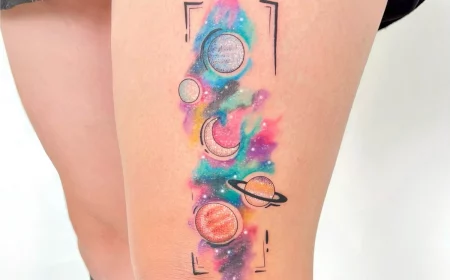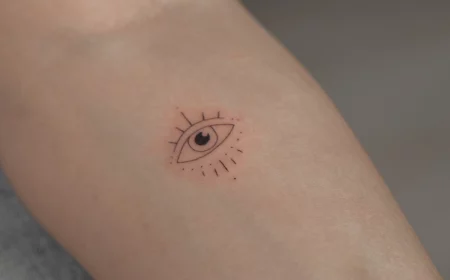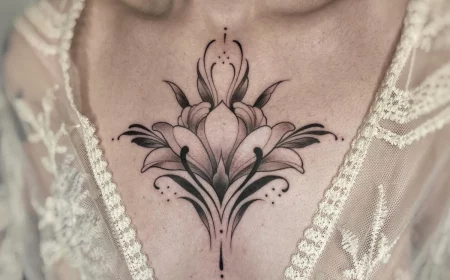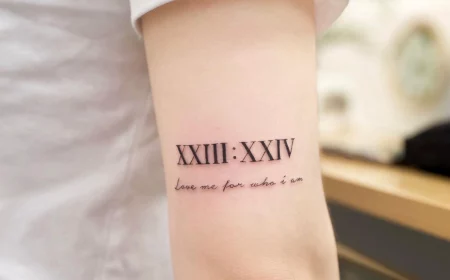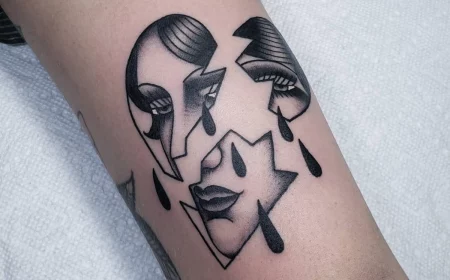A Tattoo Pro’s Guide to Getting a Spiritual Tattoo You’ll Actually Love Forever
I’ve been behind a tattoo machine for a long, long time, and I can tell you this: the tattoos that really stick with me aren’t the trendiest designs. They’re the ones with a story. They’re the spiritual tattoos—the quiet symbols, personal reminders, and bold declarations of someone’s inner world.
In this article
I’ve seen a simple, elegant symbol act as a daily anchor for someone going through a tough time. I’ve watched a massive, intricate back piece become the punctuation mark at the end of a difficult chapter in a person’s life. These aren’t just pictures; they’re a part of you.
But let’s be real, getting a tattoo is a big deal. It’s permanent. And when you tie that ink to your personal beliefs, the decision carries even more weight. My goal here isn’t to just show you a gallery of cool-looking symbols. It’s to walk you through the entire process, from the inside out. We’ll cover everything from picking a design that genuinely means something to you, to finding the right artist, and making sure that art looks amazing for decades to come.

First Things First: It’s Way More Than Just a Symbol
A spiritual tattoo is a commitment you make visible. Before you even start scrolling through designs, you need to get crystal clear on your ‘why’.
So, take a minute and ask yourself: Why this? Is it to honor a belief you hold dear? To serve as a reminder of a lesson you learned the hard way? Or maybe it’s a focus point for meditation, a symbol of your own strength? Your honest answer is the foundation for everything. A tattoo with deep personal meaning will stand the test of time, while one you picked because it was popular might feel… well, a little awkward later on.
I once had a client who wanted a symbol for overcoming obstacles as he was starting a new business. We had a long chat about it. He’d done his homework, he understood the origins, and he approached it with a ton of respect and sincerity. His intention was what made it right. And that, honestly, makes all the difference.

A Quick Word on Respectful Choices
This brings up a super important point: choosing symbols responsibly. A lot of powerful spiritual imagery comes from specific cultures and religions. It’s absolutely vital to approach these with respect, not just as a cool accessory. If you don’t belong to the culture a symbol comes from, do your homework. Understand its full meaning, not just the one-sentence summary you found online.
Some symbols, like the Om or the Hamsa, have become more widespread. Even so, taking the time to learn about their roots is a sign of respect. For other imagery, especially sacred designs from indigenous cultures, it’s generally best to admire them from afar unless you have a direct, personal connection. Don’t be surprised if a good artist declines to tattoo certain sacred symbols on someone without that cultural link. It’s not a judgment; it’s a sign of their professional integrity.
The Design Deep Dive: Symbols and Artistic Tips
Okay, once you’re clear on your ‘why,’ the fun part begins. Exploring symbols is a personal journey, but here’s how an artist thinks about some of the popular choices—not just what they mean, but how they’ll actually look and age on a living, breathing canvas.

The Lotus Flower
The lotus is all about rising from the mud to bloom in the sun, a powerful metaphor for overcoming hardship to find clarity and beauty. It’s incredibly versatile. A small, fine-line lotus on an ankle is just as beautiful as a large, full-color piece on a thigh. The key is clean linework that won’t blur over time. Good placement on a flatter area, like a forearm or upper back, really lets the flower’s natural symmetry shine.
The Om (Aum) Symbol
Considered the primordial sound of the universe in some Eastern traditions, the Om is elegant, simple, and powerful. It’s a fantastic choice for a first spiritual tattoo. It works beautifully in small sizes, think 1-2 inches on a wrist or behind an ear. But don’t let its simplicity fool you—the line weight has to be perfect. A skilled artist will make sure the curves are buttery smooth and consistent. It’s a classic for a reason.
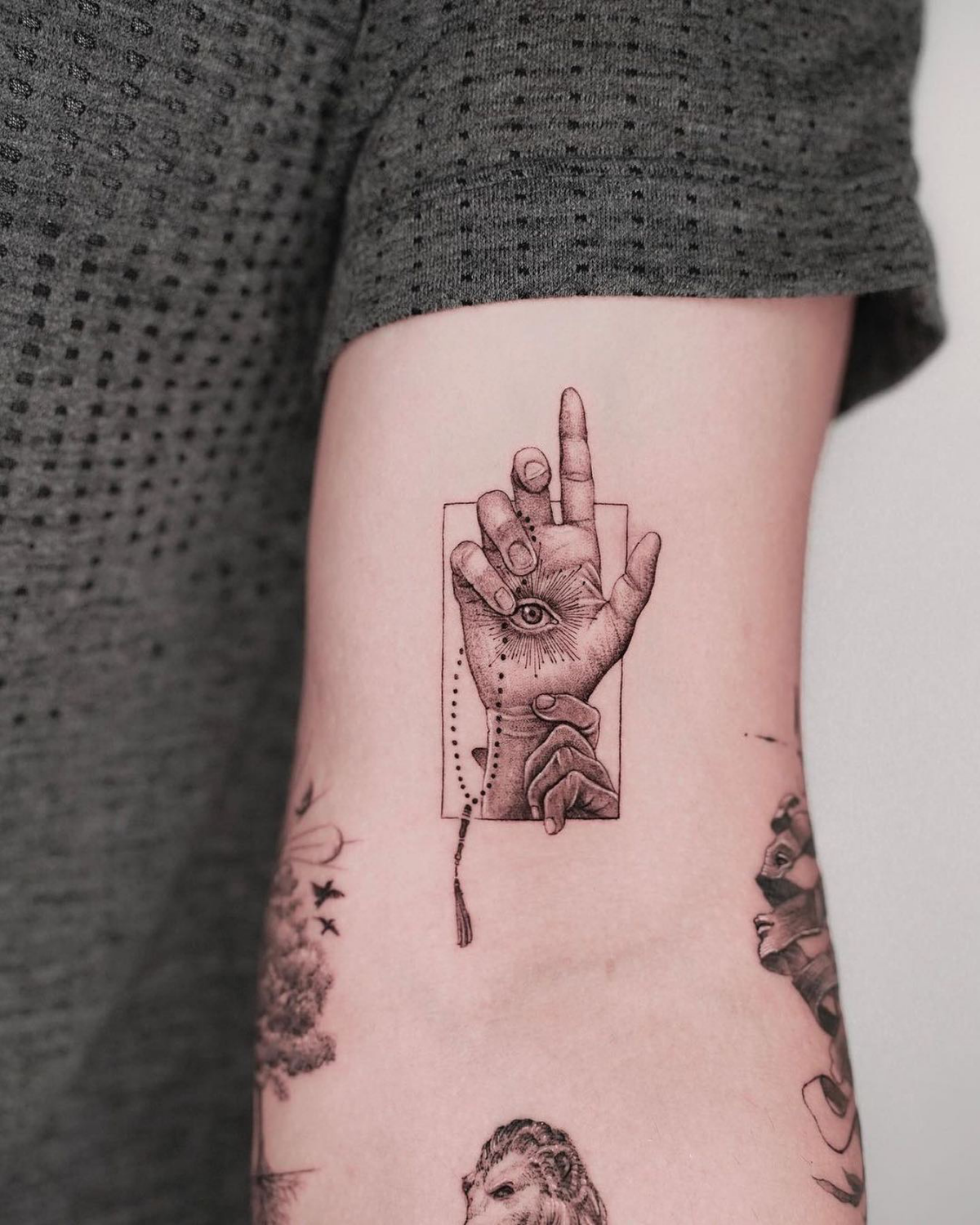
The Tree of Life
Found in countless cultures, this symbol represents the connection between all things. The roots ground us, the trunk shows strength, and the branches reach for wisdom. Artistically, this design begs for detail and space. To do it justice, you’re looking at a piece that’s at least 6 inches tall, making it perfect for a calf, thigh, or a stunning back piece. The style can vary wildly, from intricate Celtic knotwork to a more photorealistic look.
The Seven Chakras
These energy centers are often represented in a vertical line, which looks incredible running down the spine. It’s a powerful statement about balance and inner energy. The challenge here is scale. The individual symbols are intricate, and if they’re tattooed too small, they’ll turn into little smudges over the years. I always suggest dedicating a good amount of space to this design or, alternatively, picking one or two chakras that resonate with you most and getting them as separate, more detailed pieces.

Mandalas
A mandala is a geometric design representing the universe and unity. For an artist, they are a true test of precision and symmetry. They are often created with fine lines or dotwork (stippling) and look amazing on shoulders, knees, or even as a background element to frame another symbol. The flow and rhythm of a well-done mandala are just mesmerizing.
The Enso Circle
This Zen symbol looks like a simple, hand-drawn circle, but it’s one of the hardest things to tattoo well. The goal is to capture the feeling of a single, expressive brushstroke—not a perfect, computer-drawn circle. It needs to feel organic. It represents enlightenment, the universe, and the beauty of imperfection. It’s a minimalist masterpiece that speaks volumes.
Finding Your Artist & The Money Talk
Here’s the most critical piece of practical advice: your tattoo will only be as good as the artist who does it. Please don’t just walk into the first shop you see on the street. This is a partnership.

- Do Your Research: Every artist has a style. If you want a delicate, watercolor-style lotus, don’t go to someone who specializes in bold, old-school designs. Check their online portfolios and, this is the big one, look for photos of HEALED work. A fresh tattoo always looks sharp. A photo from a year later shows you the artist’s real skill.
- The Vibe Check: A professional studio should feel as clean as a clinic. When you go for a consultation, look around. Is everything wrapped in plastic? Do they use single-use needles? If you feel weird about the cleanliness, walk out. No exceptions.
- The Money Part: Let’s get real about cost. Artists typically charge by the hour, and rates can vary wildly based on their skill, experience, and location—expect anywhere from $150 to $400+ per hour. A small, simple tattoo might be a flat shop minimum (often $80-$150), but a full sleeve is a major financial commitment. We’re talking multiple long sessions, which could easily total between $5,000 and $15,000 or more.
- Tipping Etiquette: Oh yeah, don’t forget to tip your artist! It’s a service industry, and a tip of 15-25% is standard and very much appreciated. Factor that into your budget from the start.

The Consultation Checklist
Your consultation is where the magic starts. Come prepared with ideas, but be open to the artist’s expert advice. A pro won’t just copy a picture you found online; they’ll design a custom piece for you. Here are some questions to ask:
- What’s your hourly rate and do you require a deposit?
- Based on my idea, can you give me a rough time and cost estimate?
- Can I see photos of healed tattoos you’ve done in this style?
- Where do you think this would look best on my body?
- How do you think a design like this will age over the next 10-20 years?
Game Day: The Session and Healing
The day of your tattoo and the weeks that follow are just as important as all the planning. Your role in this is huge.
Prep for Your Appointment
Get a good night’s sleep and eat a solid meal about an hour before you go in. Low blood sugar can make you feel faint. Stay hydrated, but heads up: avoid alcohol and even excessive caffeine for 24 hours beforehand. Alcohol thins your blood, which means more bleeding, which can push ink out and lead to a faded result.

And, by the way, think about what you’re going to wear. Be comfortable! Wear loose-fitting clothes that give the artist easy access to the area. Getting a thigh piece? Wear shorts. A back piece? A zip-up hoodie you can wear backwards is a pro move.
The Pain Question
Does it hurt? Yes. But how much depends on you and the placement. Bony areas like the ribs, spine, ankles, and tops of the feet tend to be more intense. Fleshy spots like the outer thigh, bicep, and forearm are generally more manageable. The feeling is often described as a constant, hot, vibrating scratch. It’s not fun, but it’s temporary. Focus on deep, steady breathing—it helps more than you’d think.
Aftercare is 50% of the Final Product!
I cannot stress this enough. You could get a masterpiece, but if you botch the aftercare, it will heal poorly. Always follow your artist’s specific instructions, but here are the universal rules.

1. The Wash: Once you take off the initial wrap, you’ll gently wash the tattoo with your fingertips. Use lukewarm water and a gentle, unscented antibacterial liquid soap (basic Dial Gold is a classic for a reason). Pat it dry with a clean paper towel—no rough washcloths!
2. The Moisture: For the next 2-3 weeks, you’ll wash it 1-2 times a day and apply a VERY thin layer of recommended ointment. Thin is the key word. A thick glob suffocates the tattoo. You can use a classic like Aquaphor or Lubriderm, or a dedicated product like Hustle Butter. Your artist will tell you what they prefer.
3. The Itch: As it heals, it will flake and itch like a sunburn. DO NOT PICK. DO NOT SCRATCH. Slapping it lightly or applying a bit of moisturizer can help, but picking at it can literally pull the ink out.
Common Aftercare Pitfalls (Please Avoid These!)
- Soaking it: No baths, pools, hot tubs, or oceans for at least 2-3 weeks. Showers are fine.
- Sun exposure: Keep your new tattoo completely out of the sun while it’s healing.
- Over-moisturizing:** A thick layer of ointment can trap bacteria. Less is more.

Healing Gone Wrong: Signs of an Infection
Normal healing involves some redness, swelling, and peeling. An infection is different. Look for spreading redness that gets worse, excessive swelling, yellow or green pus, a foul odor, or if you develop a fever. If you suspect an infection, don’t wait. See a doctor right away.
The Long Game: Living With Your Ink
Once it’s healed, your job is to protect your investment. The #1 enemy of a tattoo is the sun. UV rays break down ink particles and turn crisp lines into blurry messes. The single most important thing you can do is wear a high-SPF sunscreen (30+) on your tattoos whenever they’re exposed. Do this, and your art will stay vibrant for a lifetime.
A spiritual tattoo is a fusion of art, belief, and your own skin. It’s a journey. Take your time, do your research, and choose an artist you genuinely connect with. When you approach it with intention and respect, you’ll get a piece of art that truly means something to you, forever.

Inspirational Gallery


When choosing an artist for your spiritual piece, look beyond technical skill. Scrutinize their portfolio for the *feeling* they capture. Do they specialize in the style you envision, like delicate fine-line work or bold geometric patterns? An artist who frequently works with mandalas, deities, or nature-inspired symbolism will understand the nuance and reverence required, transforming a simple tattoo session into a truly collaborative and respectful experience.

- Stay Hydrated: In the days leading up to your appointment, drink plenty of water. Hydrated skin takes ink more easily and can make the process smoother.
- Eat a Good Meal: Never get tattooed on an empty stomach. A solid meal a couple of hours beforehand helps keep your blood sugar stable and reduces the risk of feeling faint.
- Moisturize, But Not on the Day: Keep the target area well-moisturized in the week before, but avoid applying any lotion or oil on the day of your session.

Placement is part of the message. A tattoo on your forearm is a daily, visible reminder for yourself and the world. A piece on your ribs or back is more private, a secret source of strength known only to you. Consider the energy: a symbol on your back can represent what supports you, while one on your chest is close to the heart, guarding your core values.

The oldest known tattoos were found on Ötzi the Iceman, dating back to the 4th millennium BC. Many researchers believe his 61 tattoos, simple dots and lines, were not decorative but therapeutic or spiritual, placed on acupuncture points to alleviate pain.


Thinking of incorporating color? Symbolism can add another layer of meaning to your design.
- Blue: Often associated with serenity, intuition, and the throat chakra (communication).
- Green: Represents nature, growth, and the heart space. Think renewal and balance.
- Red: A color of vitality, passion, and grounding energy tied to the root chakra.
- Gold/Yellow: Symbolizes enlightenment, the sun, and divine consciousness.

Can I just get a copy of a beautiful spiritual tattoo I found on Pinterest?
It’s a common question, but the answer from any reputable artist is a firm ‘no’. A truly spiritual tattoo is deeply personal. Using someone else’s custom design is not only disrespectful to the original wearer and artist, but it also dilutes your own intention. Use images for inspiration, to show your artist the style and elements you like, but always aim to create something that is uniquely yours.

Vegan Ink: Most modern, high-quality inks are vegan. They use vegetable-based glycerin and pigments. Brands like World Famous Ink, Intenze, and Dynamic are known for their vibrant, cruelty-free options.
Traditional Ink: Older or cheaper inks may contain bone char for black pigment, gelatin as a binder, or shellac from beetles. Always ask your artist if you have a preference.
Ultimately, a conversation with your artist about the products they use ensures your tattoo aligns with your ethical values.

A 2021 study revealed that ‘fine-line’ was one of the most searched-for tattoo styles.
This trend is perfect for spiritual tattoos. The delicate nature of single-needle work allows for intricate details in symbols like the Unalome, subtle constellations, or minimalist sacred geometry. It offers a way to wear your beliefs with an understated elegance, making the symbol feel like a natural, almost-drawn-on part of you.


- A deeper connection to your intention.
- A calmer, more centered experience during the session.
- A finished piece that feels imbued with purpose from the very start.
The secret? A simple pre-tattoo ritual. The night before or the morning of, take 10 minutes to meditate on your ‘why’. Write down what the symbol means to you. This small act of mindfulness transforms the appointment from a transaction into a ceremony.

Don’t let budget be the primary driver for a spiritual tattoo. A cheap tattoo often means rushed work, lower-quality materials, or an inexperienced artist. This is a permanent mark of your inner world; it’s worth saving for and investing in an artist whose work truly resonates with you and who will honor your story.

“Symbols are the language of the soul.” – Carl Jung

Is there an ideal aftercare product?
Many artists have their favorites, but two standouts are Hustle Butter Deluxe, a 100% natural and vegan glide that’s great for use during and after tattooing, and protective ‘second skin’ bandages like Saniderm or Recovery Derm Shield. These clear, breathable films are applied by the artist and left on for several days, protecting the new tattoo from bacteria and eliminating the need for constant washing and moisturizing in the initial healing phase.


If you’re drawn to imagery from a culture that isn’t your own, pause and research. Is the symbol part of a closed practice, reserved only for initiates? The White Sage of smudging or the specific design of a Native American war bonnet are examples. Respectful appreciation means understanding the history and significance, choosing open symbols, and never claiming an identity that isn’t yours.

Your tattoo’s vibrancy is a long-term commitment. Sun exposure is the number one cause of fading and blurring. Make a high-SPF sunscreen a non-negotiable part of your daily routine for any exposed tattoos. A mineral-based sunscreen with zinc oxide offers excellent physical protection without irritating sensitive skin.

Fine-Line: Uses a single, small needle to create delicate, detailed work. Perfect for minimalist symbols, script, and intricate geometric patterns.
Dotwork: Creates shading and form using thousands of tiny dots. Often used for mandalas and spiritual patterns, giving a unique, almost ethereal texture.
Both styles require a specialist with a very steady hand. Check the artist’s healed work to see how their lines and dots hold up over time.

Beyond traditional symbols, consider what represents your spirit. Is it a specific flower that resiliently grows in your hometown? The chemical structure of serotonin, representing your journey with mental health? Or perhaps an abstract flow of lines that map a personal transformation? The most powerful spiritual tattoos are often the ones you create yourself.


- A feeling of calm resolve.
- A marked sense of a new beginning.
- A physical reminder of your inner strength.
The source? The tattoo itself is a meditative process. The focused buzz of the machine, the rhythmic breathing to manage sensation—many people find the experience grounds them in the present moment, acting as a powerful, transformative ritual.

A crucial moment: The artist applies the stencil. This is your last chance to make changes. Is it perfectly centered? Is the size exactly what you envisioned? Is it flowing with the curve of your body? A good artist will welcome your feedback and make adjustments. Don’t be shy; speaking up now prevents a lifetime of wishing it were an inch to the left.

For those hesitant about permanence, test-driving your spiritual symbol can be a wise step. Services like Inkbox offer high-quality, plant-based temporary tattoos that last 1-2 weeks. This gives you a chance to live with the design, see how the placement feels, and confirm your connection to it before making a lifelong commitment.

How do artists price large spiritual pieces, like a full back or sleeve?
Most artists will charge by the hour for large-scale, multi-session work, rather than a flat rate. Rates can vary dramatically based on the artist’s location, experience, and demand. They may also require a significant deposit that covers drawing time and secures your appointment slots. Always discuss the estimated number of sessions and total cost upfront.


Some of the most profound spiritual tattoos come directly from nature’s symbolism.
- The Lotus: A classic symbol of purity and enlightenment, as it rises beautifully from muddy waters.
- The Moon Phases: Represents cycles, change, and the passage of time. A reminder that all things are transient.
- A Tree: Symbolizes roots, family, growth, and connection between the earth and the sky.

“The wound is the place where the Light enters you.” – Rumi
Many spiritual tattoos are born from this idea. They don’t hide scars, whether physical or emotional, but instead acknowledge them as part of a journey. A tattoo placed over a scar can be an act of reclamation, transforming a place of pain into a symbol of healing and resilience.

Don’t overlook the power of abstract design. You can represent your spiritual journey without a single recognizable symbol. Use flowing lines to depict your life’s path, a burst of watercolor to capture a moment of epiphany, or geometric shapes to represent balance and stability. It’s a deeply personal language only you need to understand.

Important consideration: A tattoo looks different on skin than on a white screen. Pigment sits under your unique skin tone, which acts as a filter. A bright yellow on paper might look more mustard-like on olive skin. A great artist will know how to adjust colors and saturation to work with your complexion, ensuring the final result is as vibrant as you imagine.
Your spiritual tattoo journey doesn’t end when you leave the studio. It will age with you. Lines may soften and spread slightly over decades. Colors may mellow. This isn’t a flaw; it’s a feature. See it as the art becoming a true part of you, evolving as you do. A well-done tattoo from a skilled artist will remain clear and beautiful through this natural process.

